DO THIS AND YOU WILL NEVER FACE ANY PROBLEM IN FINDING KEYWORDS IN 2021
- Spend your hours to write better contents not in search keyword.

What are keywords?
Keywords are the words and phrases that people type into search engines. They’re also known as search queries or “SEO keywords.”

What is keyword research?
Keyword research is the process of understanding the language your target customers use when searching for your products, services, and content. It then involves analyzing, comparing, and prioritizing the best keyword opportunities for your website.
Why is keyword research important?
Keyword research is the only way to figure out what people are typing into search engines. You need to know this to avoid creating content about things that nobody is searching for. Many website owners make that mistake, and it’s likely a big part of the reason why 90.63% of pages get no traffic from Google, according to our study.
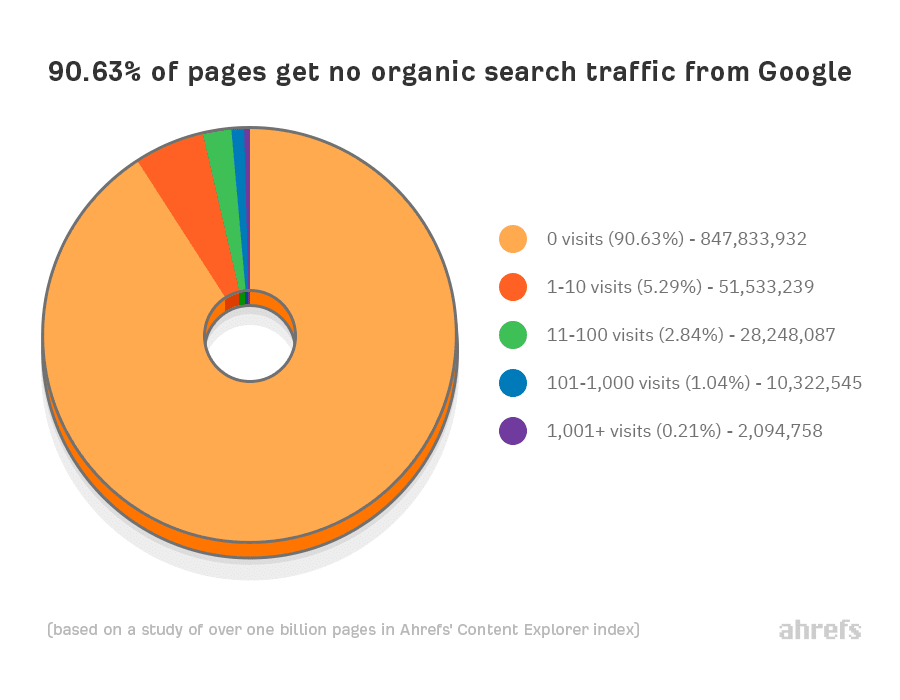
Keyword research also helps you to answer questions like:
Finding the right answers to these questions will help you pick your battles wisely.
How to find keyword ideas
Keyword research starts with thinking about how potential customers might be searching for your business or website. You can then use keyword research tools to expand on those ideas and find even more keywords.
It’s a simple process, but two things need to be true to do it well:
- You need to have good knowledge of your industry.
- You need to understand how keyword research tools work and how to get the most out of them.
In this chapter, we’ll run through a few actionable ways to improve your knowledge in both those areas and discover potentially winning keywords for your website in the process.
- Brainstorm ‘seed’ keywords
- See what keywords your competitors rank for
- Use keyword research tools
- Study your niche
1. Brainstorm ‘seed’ keywords
Seed keywords are the foundation of the keyword research process. They define your niche and help you identify your competitors. Every keyword research tool asks for a seed keyword, which it then uses to generate a huge list of keyword ideas (more on that shortly).
If you already have a product or business that you want to promote online, coming up with seed keywords is easy. Just think about what people type into Google to find what you offer.
For example, if you sell coffee machines and equipment, then seed keywords might be:
Note that seed keywords themselves won’t necessarily be worth targeting with pages on your website. As the name suggests, you’ll use them as ‘seeds’ for the next steps in this process. So don’t obsess too much over your seed keywords. It should only take a few minutes to find them. As soon as you have a handful of broad ideas related to your website’s topic, move on to the next step.
2. See what keywords your competitors rank for
Looking at which keywords already send traffic to your competitors is usually the best way to start keyword research. But first, you need to identify those competitors. That’s where your brainstormed list of keywords comes in handy. Just search Google for one of your seed keywords and see who ranks on the front page.
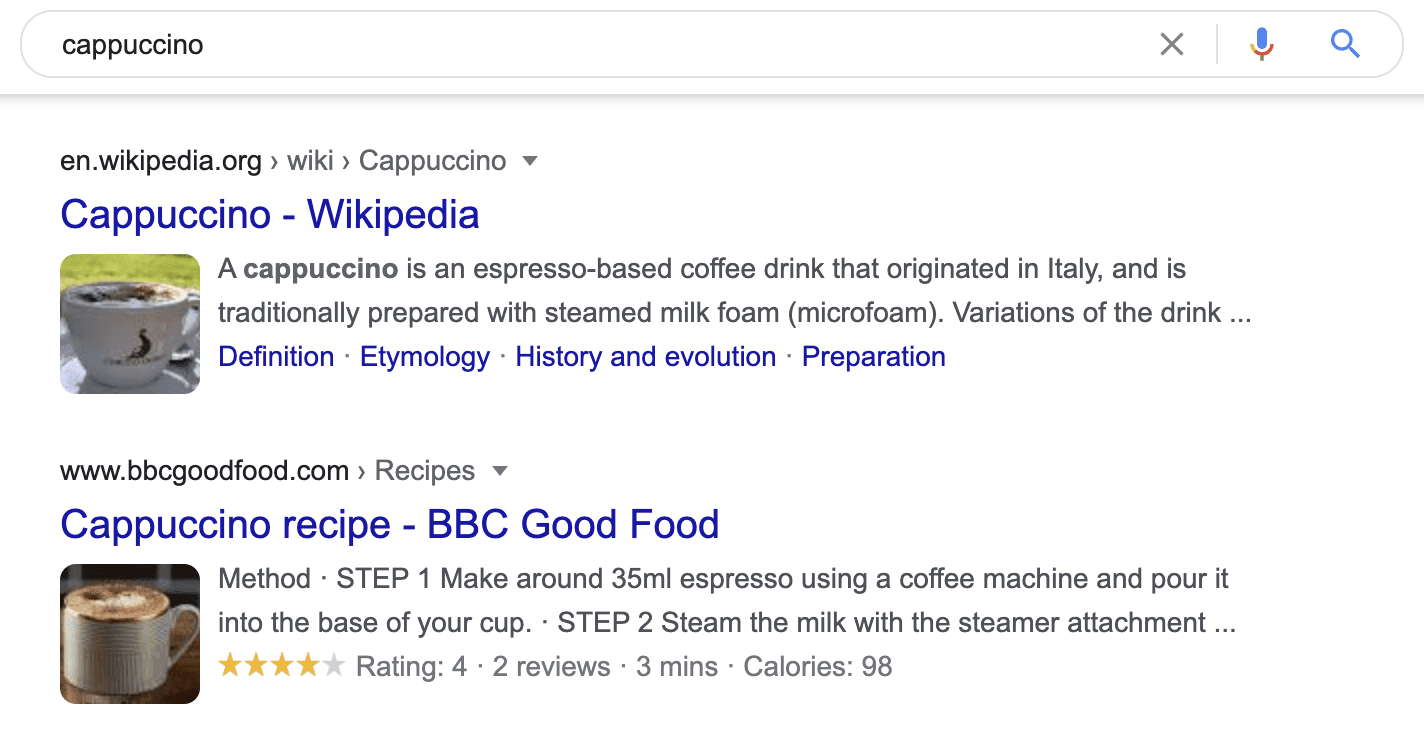
If none of the top-ranking websites for your seed keywords are like your site (or where you’re trying to take it), try searching for relevant ‘autosuggest’ queries instead.
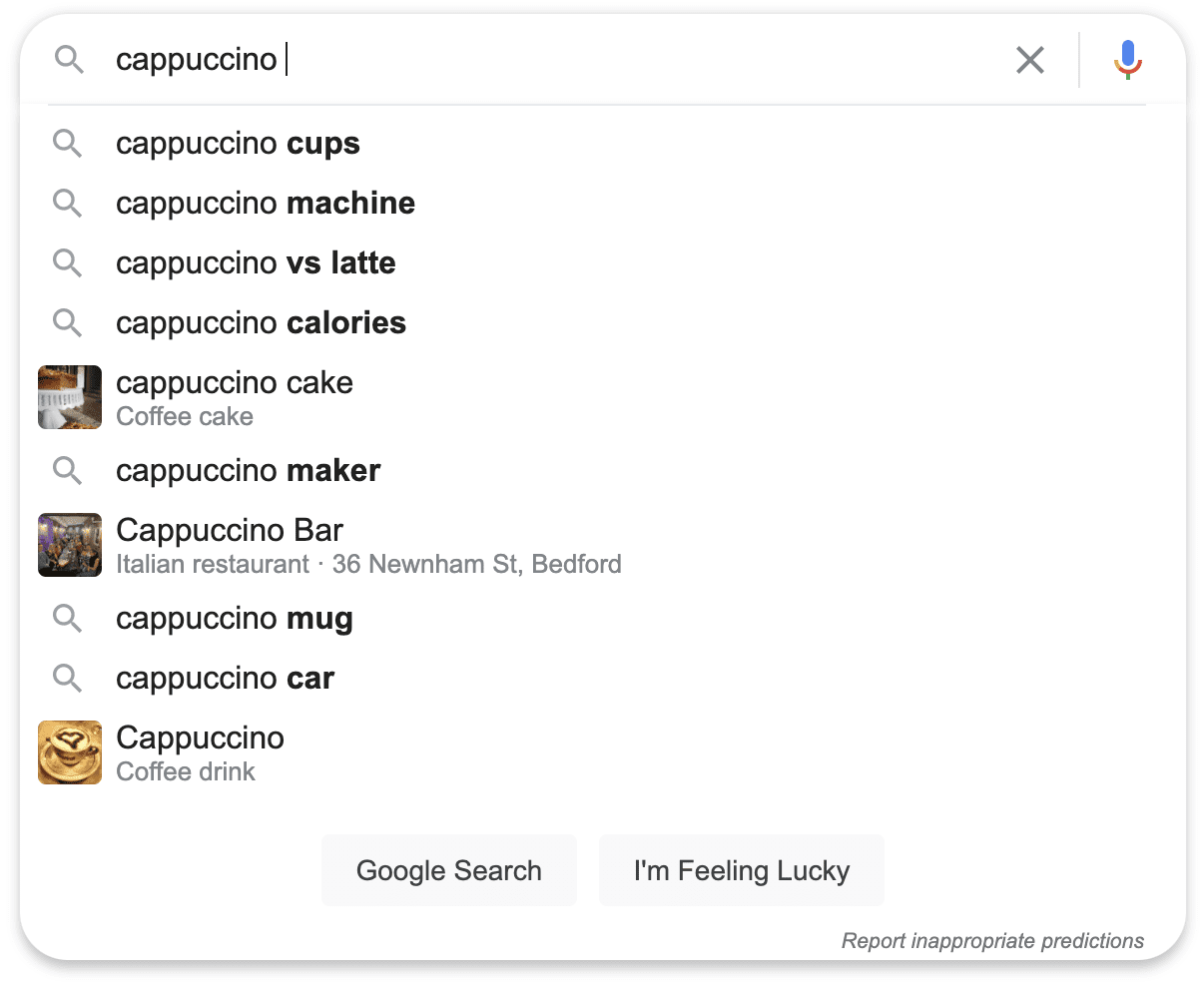
Google’s ‘autosuggest’ queries pop up as you type your query.
For example, if you sell coffee equipment, you might find more actual competitors in the search results for “cappuccino maker” than “cappuccino.” That’s because it’s mostly ecommerce stores like yours ranking for the former, and blogs ranking for the latter.
Either way, you still need to use your best judgment when determining competing websites. If you see huge brands like Amazon or The New York Times ranking for your seed keyword, you shouldn’t necessarily treat them as competitors. Always look for websites that resemble your own—or where you’re trying to take it.
Once you find a few websites that fit the bill, you can plug these websites into a competitive intelligence tool like Ahrefs’ Site Explorer one by one, then check the Top Pages report. You’ll then see their popular pages by estimated monthly search traffic. The report also shows each page’s “Top keyword.” That’s the one sending it the most organic traffic.
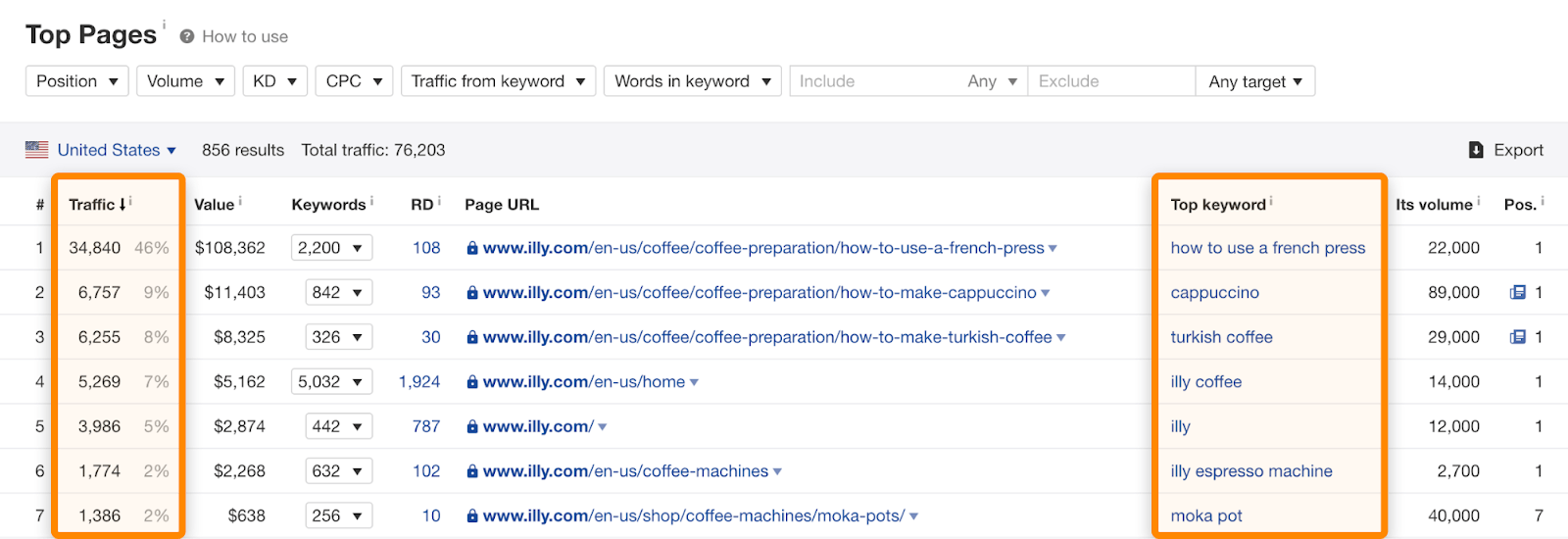
Data via the Top Pages report in Ahrefs’ Site Explorer.
Here are a few interesting keywords we discovered for our hypothetical coffee store, just by analyzing one competing website with Site Explorer:
As you can see, even if you’re quite familiar with your industry, you can still find plenty of unique keyword ideas by studying your competitors that you probably wouldn’t have found from brainstorming alone.
If you checked all the competitors in the search results but still want more keywords, you can find more competitors in the Competing Domains report in Site Explorer. Just plug in one of your known competitors, and it’ll suggest other similar sites based on the number of the overlapping keywords that they rank for Google.
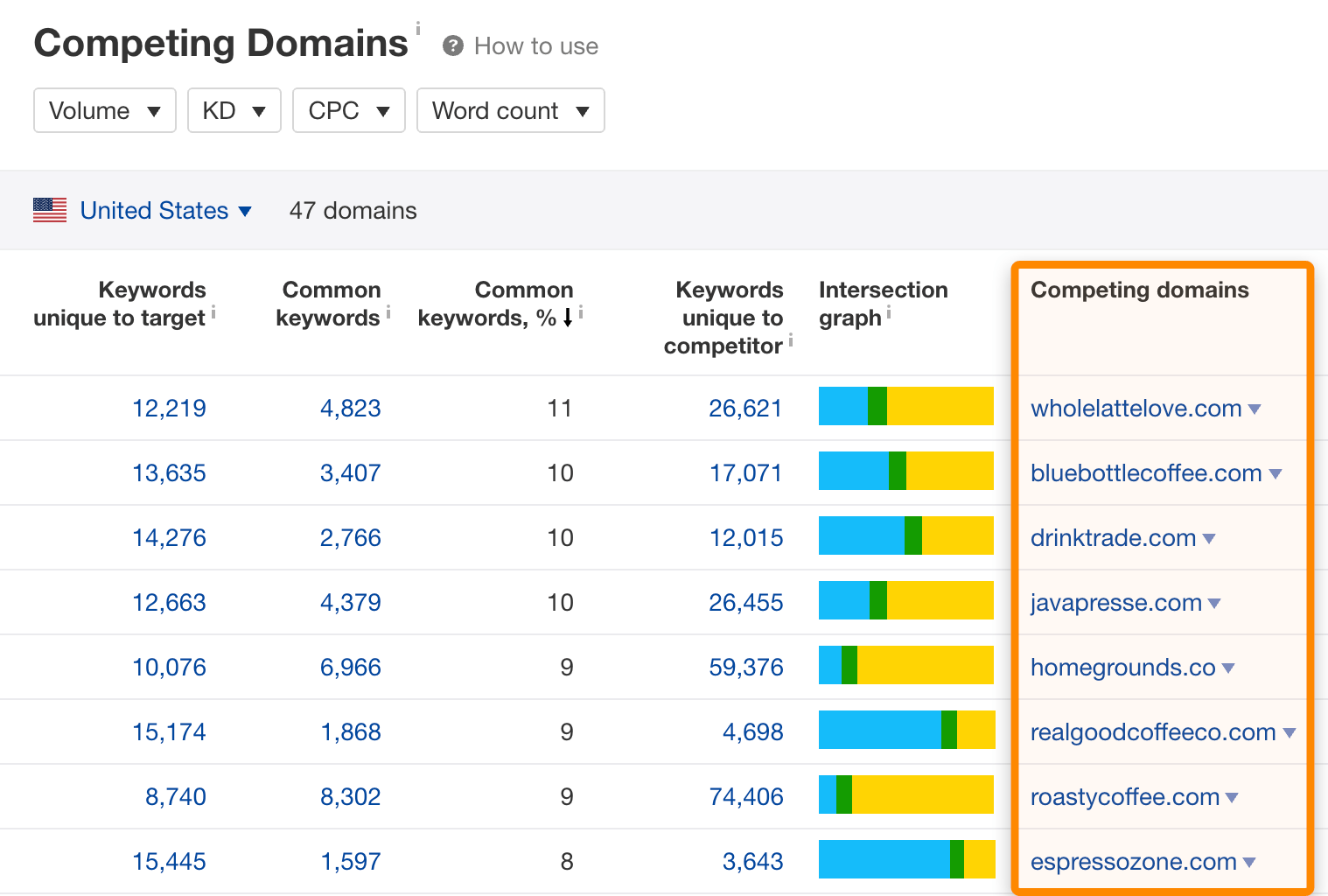
Competing Domains report in Ahrefs’ Site Explorer.
You can repeat the process above over and over for near-unlimited keyword ideas.
If you’re doing keyword research for an established website in your industry, you might find that you’ve already covered most of your competitors’ keywords. In this case, you can try using our Content Gap tool. It finds keywords that one or more competitors rank for, but you don’t. To use it, plug a few competing domains into the top section, then paste your site into the bottom field and hit “Show keywords.”
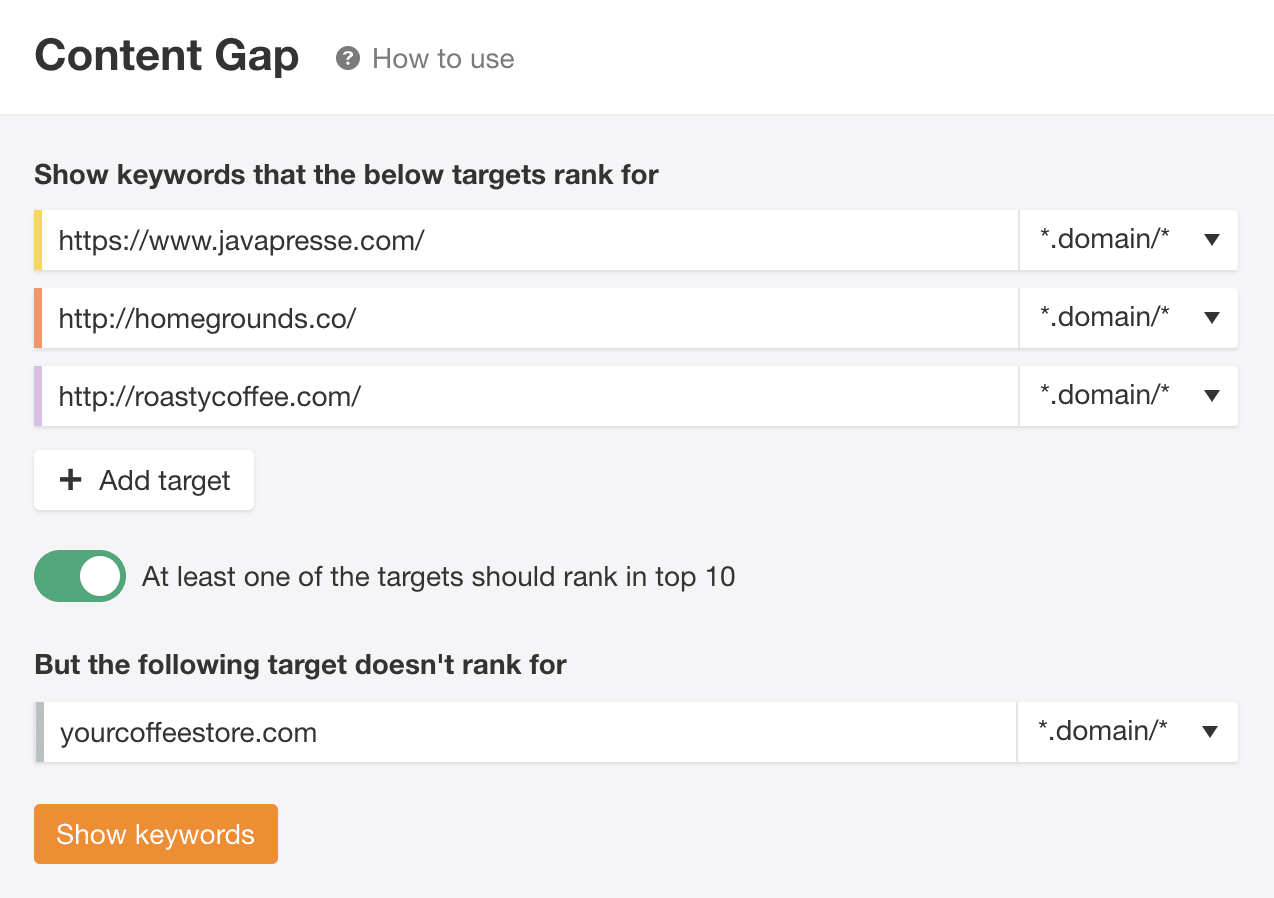
Enter competing sites in Ahrefs’ Content Gap tool.
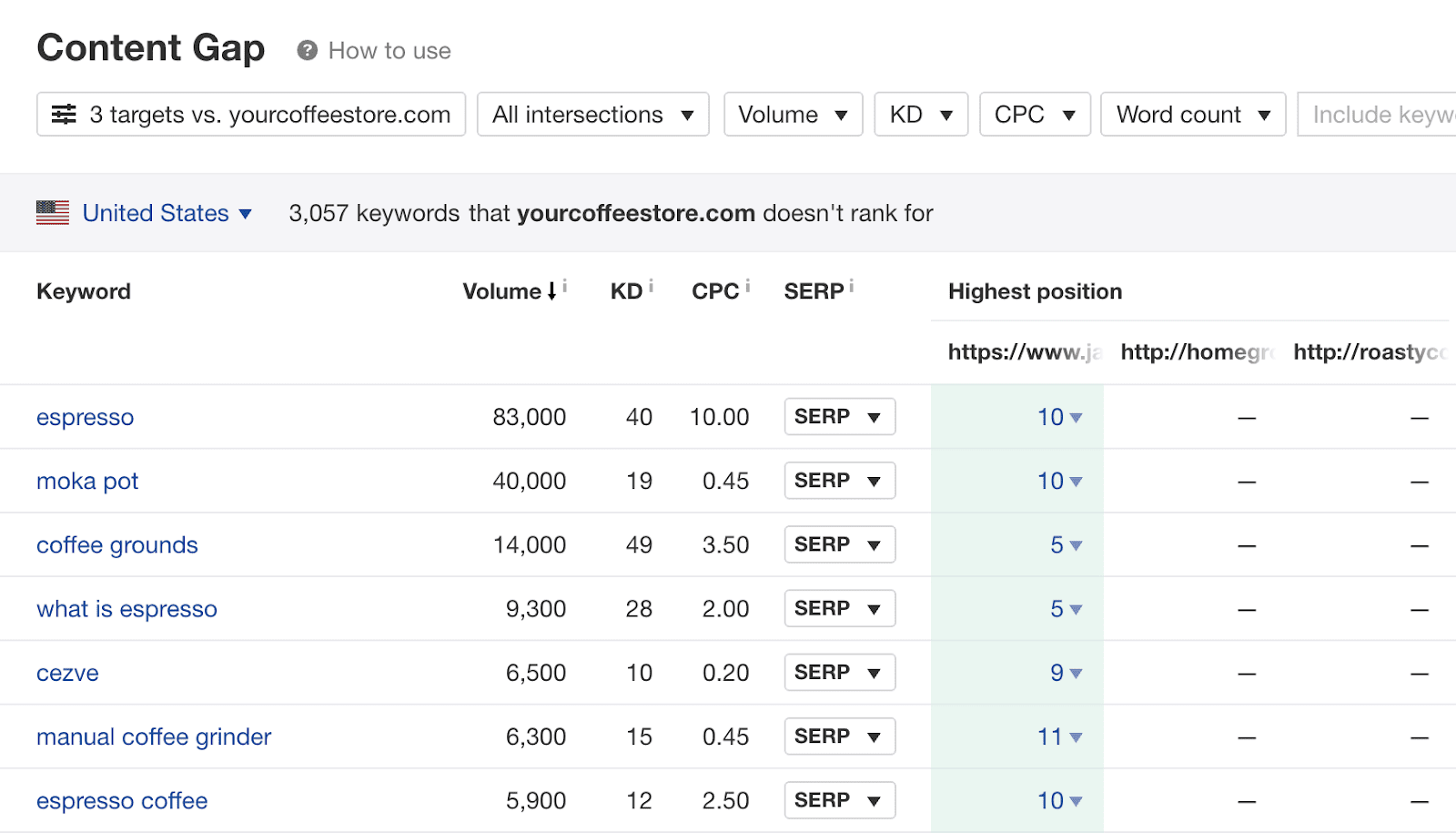
Get a list of keywords that competitors rank for, but our site doesn’t, in Ahrefs’ Content Gap tool.
Here are just a few keywords of the thousands that Homegrounds and Roasty Coffee rank for, but yourcoffeestore.com doesn’t:
Learn more about performing a content gap analysis in this video.
3. Use keyword research tools
Competitors can be a great source of keyword ideas. But there are still tons of keywords your competitors aren’t targeting, and you can find these using keyword research tools.
Keyword research tools all work the same way. You plug in a seed keyword, and they pull keyword ideas from their database based on that keyword.
Google Keyword Planner is perhaps the most well-known keyword tool. It’s free to use, and although it’s mainly for advertisers, you can also use it to find keywords for SEO.
Let’s enter a few of our seed keywords and see what it kicks back:
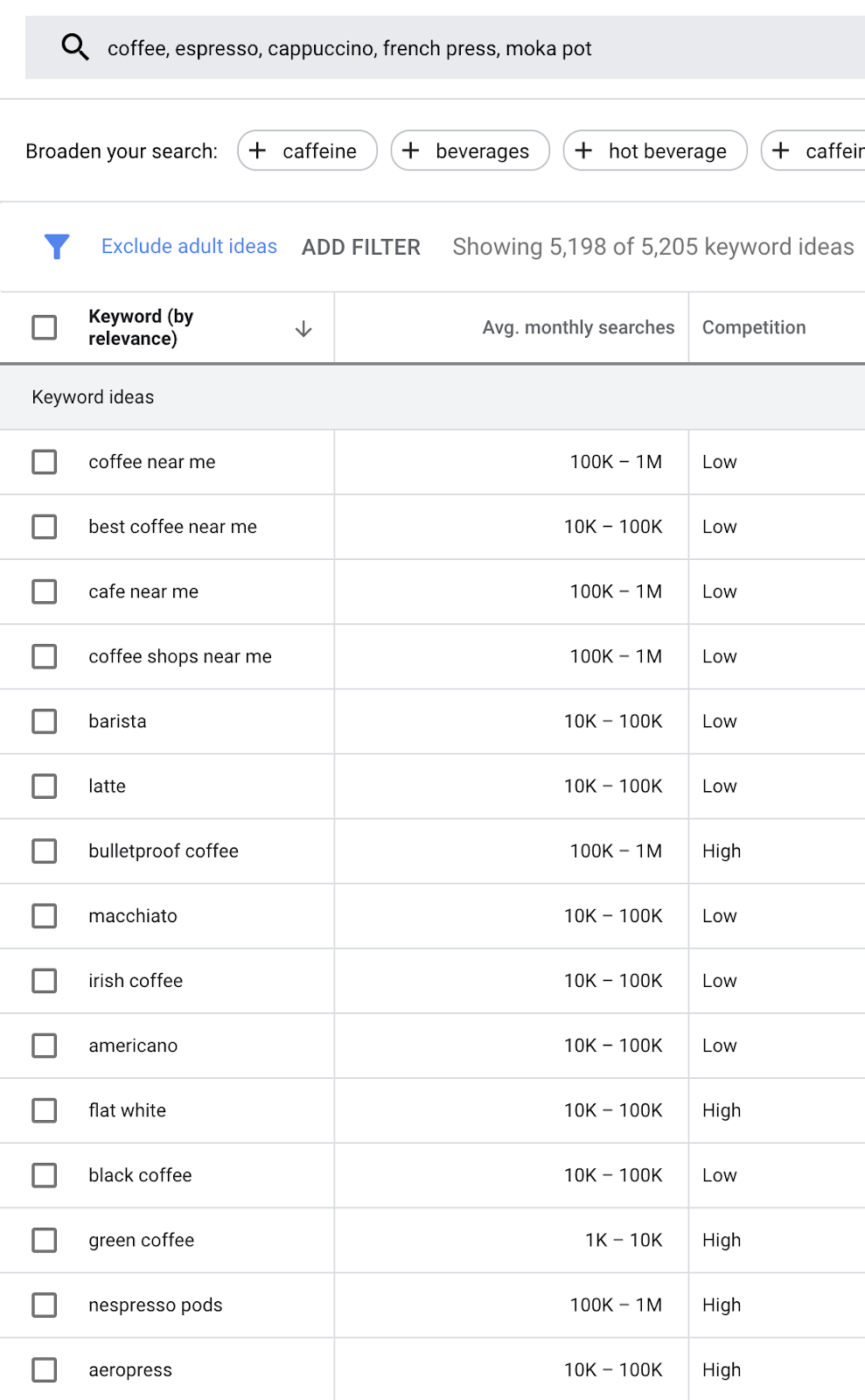
You’ll notice that Google Keyword Planner is smart enough to show you relevant keyword ideas, even if they don’t contain your seed keywords. Take “k cups,” for example. Unless you’re a hardcore coffee connoisseur, you probably wouldn’t know this relates to coffee.
Beyond Keyword Planner, there are quite a few other free keyword research tools. These are great if you’re on a budget, but you’ll quickly realize that they’re all very limited in their data and functionality since their goal is to convert you to a paying customer.
If you’re serious about keyword research, you may as well skip the free tier and use a ‘professional’ tool like LONG TAIL PRO right off the bat.
Let’s SEE see how many ideas it generates.
The ‘Phrase match’ report in Keywords Explorer gives us almost four million keyword ideas from just four seed keywords.
3.7 million ideas. And that’s just from the “Phrase match” report. Other keyword ideas reports match keywords ideas in different ways.
Here’s how the reports in Keywords Explorer match keyword ideas:
1. Exact Search Volume, and Keyword Competitiveness
Long Tail Pro provides exact search volume data, as well as our industry-leading Keyword Competitiveness (KC) metric. You can search for specific keywords, or get hundreds of keyword suggestions at a time.
2. Find Hundreds of New Low Competition Keywords
Use the Google AdWords Suggestions to find hundreds of new related keywords in minutes, for any country or language.
3. Pick the Best Keywords, with Personalized Metrics
View your domain statistics and pick the best keywords for your site. Use Target KC to find out which keywords are easy, which ones will take extra effort, and which ones to avoid.
Now, that might seem like an overwhelming amount of ideas, and it is. But don’t worry. You’ll learn how to narrow these down right in the tool ahead.
With this tool you are never going to face any problem in searching key words as this TOOL Does EVERYTHING FOR YOU!!
In-Depth Competition Analysis
1. Track Your Progress
Measure your success and keep tabs on how you're doing with the Brand New Rank Tracker feature in Long Tail Pro, fresh out of beta testing. Based on feedback from 70,000 marketers
2. Focus Your Efforts
Know how close you are to the top result for all your keywords so you can hone in on your winning keywords and start seeing results even faster
3. Get it for FREE
Typical Rank Tracking software can cost you up to $99/month - and that's on top of all the other tools you use to help your business succeed... With Long Tail Pro, you get the Rank Tracking feature for FREE with any Monthly or Annual Plan!
How Rank Tracker Works
BONUS: You can also export your graph and show it to your boss or client.
Trained SEOs Dedicated to Your Success Week After Week
Case Study: How Michael Used LTP To Rank #1 In The Most Competive Niche
Michael runs a blog in the "online marketing" niche, one of the toughest SEO environments on the planet.
It's a space where seemingly every keyword with any search volume has been swallowed up by high authority big-brand websites.
Despite the competition, Michael was still able to use Long Tail Pro to find untapped keywords that drive passive traffic and leads every month.
Results: Two #1 rankings which drove traffic and leads to Michael’s business.
SO WHAT RE YOU WAITING FOR CLICK THE LINK AND GET ONE FOR YOURSELF!! JUST TRY IT FOR SOMETIME IN JUST $1 THEN DECIDE WEATHER TO USE IT OR NOT...
COME ON JUST GIVE IT A TRY FOR $1 ( YOU A RE ANYWAY GOING TO WASTTE THAT $1 IN SOMETHING OR THE OTHER INSTEAD OF THAT USE IT IN SOMETHING WHICH IS GOING TO GIVE YOU A RETURN ATLEAST DOUBLER OF THEW INVESTED AMOUNT)
THINK ABOUT THE ZEROS YOU ARE GOING TO ADD TO THIS FIGURE AFTER YO USE THIS TOOL.



No comments:
Post a Comment